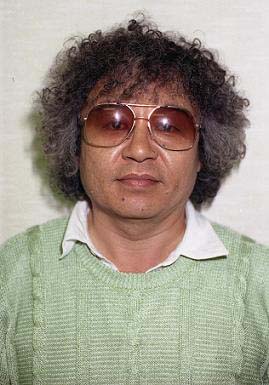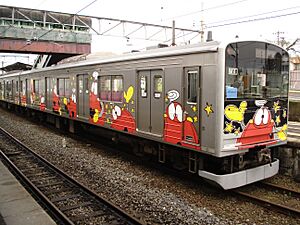Shotaro Ishinomori facts for kids
Quick facts for kids
Shotaro Ishinomori
|
|
|---|---|
 |
|
| Born | Shotaro Onodera 25 January 1938 Tome, Miyagi Prefecture, Japan |
| Died | 28 January 1998 (aged 60) Bunkyō, Tokyo, Japan |
| Occupation | Manga artist |
| Language | Japanese |
| Period | 1954–1998 |
| Genre | Science fiction |
| Notable works |
|
| Notable awards | Tezuka Osamu Cultural Prize (1998) |
Shotaro Ishinomori (石ノ森 章太郎, Ishinomori Shōtarō, 25 January 1938 – 28 January 1998) was a famous Japanese manga artist. He was a very important person in the world of manga (Japanese comics), anime (Japanese animation), and tokusatsu (special effects shows).
He created many popular and long-running series. Some of his most famous works include Cyborg 009, the Super Sentai series (which later became the Power Rangers series), and the Kamen Rider series. He won the Shogakukan Manga Award twice for his amazing work. Shotaro Ishinomori was born as Shotaro Onodera in Tome, Miyagi. He changed his last name to Ishinomori in 1986.
Contents
A Creative Career in Manga and Anime
Shotaro Ishinomori started his career very early. In December 1954, he published his first work, Nikyuu Tenshi. This was in a magazine called Manga Shōnen.
Working with Osamu Tezuka
In 1956, he moved to Tokyo. There, he became an assistant to Osamu Tezuka, another legendary manga artist. Ishinomori helped with famous works like Astro Boy. He also worked on Alakazam the Great.
Creating Iconic Heroes
In 1960, Ishinomori released Flying Phantom Ship. This manga was later made into an animated movie in 1969. In 1963, he created Cyborg 009. This was Japan's first superhero team with special powers. It featured nine cybernetic (part-robot, part-human) warriors.
Ishinomori also founded an anime company called Studio Zero in 1963.
The Birth of Transforming Heroes
A very successful TV show, Kamen Rider, came out in 1971. This show was produced by Toei Company. It led to the creation of the "transforming" (henshin) superhero. These are human-sized heroes who change their form with a special pose. They use martial arts to fight bad guys and monsters.
Ishinomori then created many more superhero shows. These included Android Kikaider, Inazuman, and Himitsu Sentai Gorenger. Gorenger was the very first Super Sentai series. He also made popular children's shows like Ganbare!! Robokon.
His Artistic Style
Ishinomori's art style was similar to his mentor, Osamu Tezuka. Tezuka was very impressed by Ishinomori's drawings. He even asked him to work on Astro Boy. After high school, Ishinomori lived with Tezuka for several years.
Manga for Video Games
Ishinomori also drew a comic book version of the video game The Legend of Zelda: A Link to the Past. This comic was made for the American magazine Nintendo Power. It had 12 chapters and was very popular.
His Final Work and Legacy
Near the end of his life, Ishinomori asked a young manga artist, Kazuhiko Shimamoto, to continue his 1970 manga Skull Man. This manga was actually the idea that later led to Kamen Rider. Shimamoto was honored to work on his idol's final big project.
Death and Lasting Impact
Shotaro Ishinomori passed away on January 28, 1998. He died just three days after his 60th birthday. His last TV show was Voicelugger, which aired a year later.
Two years after his death, the Kamen Rider series was brought back to life. All the Kamen Rider shows made since then still credit Ishinomori as their original creator.
Honors and Records
The Ishinomori Manga Museum was opened in his honor in Ishinomaki, Miyagi, in 2001. Special trains on the Senseki Line are decorated with his artwork. These trains often lead to the museum.
Ishinomori holds a Guinness World Record. He published the most comic book pages by one author. He created over 128,000 pages across 770 titles!
Many famous manga artists say Ishinomori influenced them. These include Katsuhiro Otomo, Naoki Urasawa, and Go Nagai. They called him a "flag-bearer" and praised his amazing drawing techniques.
Selected Works
| Year(s) | Original title | Translated title | Volumes |
|---|---|---|---|
| 1954–55 | 二級天使 | Nikyuu Tenshi | 1 |
| 1960 | 空飛ぶゆうれい船 | Flying Phantom Ship | 1 |
| 1964–81 | サイボーグ009 | Cyborg 009 | 36 |
| 1964–69 | さるとびエッちゃん | Sarutobi Ecchan | 5 |
| 1966–72 | 佐武と市捕物控 | Sabu and Ichi's Detective Memoirs | 17 |
| 1967–74 | 009ノ1 | 009-1 | 6 |
| 1970 | スカルマン | The Skull Man | 1 |
| 1971–72 | 仮面ライダー | Kamen Rider | 4 |
| 1972–74 | キカイダー | Kikaider | 6 |
| 1973–74 | イナズマン | Inazuman | 4 |
| 1975–76 | 秘密戦隊ゴレンジャー | Himitsu Sentai Gorenger | 2 |
| 1984–98 | Hotel | Hotel | 37 |
| 1986 | マンガ日本経済入門 | Japan Inc.: An Introduction to Japanese Economics | 2 |
| 1987–88 | 仮面ライダーBlack | Kamen Rider Black | 6 |
| 1992 | ゼルダの伝説~神々のトライフォース | The Legend of Zelda: A Link to the Past | 1 |
 | Claudette Colvin |
 | Myrlie Evers-Williams |
 | Alberta Odell Jones |


